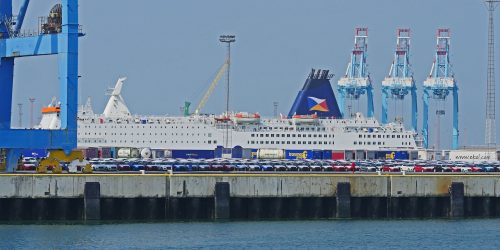10 UK Export News You Might’ve Missed - Week 19

(Also published on LinkedIn)
In this edition of Export News from Expordite, we’ll cover top 10 UK export news and headlines from week 19 of 2023 – May 8-14, 2023.
General Export News:
1. Joint outcome statement: UK-India round nine FTA negotiations
“In continuation of the eighth round of negotiations held during 20-31 March 2023 in new Delhi, the United Kingdom and the Republic of India held the ninth round of talks during 24-28 April for a UK-India FTA.
As with previous rounds, these were conducted in a hybrid fashion – a number of officials from India travelled to London and others attended virtually.
During the round, detailed discussions took place across a range of policy areas.
The tenth round of negotiations is due to take place in the coming months.”
Source: GOV.uk
2. Digitalisation of trade and the need for more training are international issues
“There’s a real understanding that international trade is changing and is going to continue to change, driven partly by the supply chain meltdown caused by COVID and by technological advancements.
My most recent trip was to Dubai, to participate in the World Freezone Annual Conference. Which was addressed by IOE&IT’s very own Kevin Shakespeare, director of special projects and international trade. Kevin highlighted two essential elements of international trade.
First, he pointed to the professionalisation of trade and how those involved in international trade need to understand the rules and regulations and how they apply, but also need to ensure the businesses involved in international trade don’t experience delays or put themselves at risk.
Second, he looked at the digitalization of international trade and what it is going to mean for businesses. With the electronic trade documents bill (ETDB) going through the Houses of Parliament, the UK has the potential to be at the heart of this transformation. The Institute is playing a central role in advising, supporting and developing this new global digital trade environment, but is also providing policy and regulatory advice.”
Source: The Institute of Export & International Trade
3. Foreign secretary Cleverly confirms government ‘not prioritising’ trade deal with the US
“Foreign secretary James Cleverly has said the UK is “not prioritising an FTA with the US”, during an official visit to Washington DC yesterday (9 May).
Cleverly said that the UK would look at “areas where we can work more closely, more collaboratively, have real economic coordination that does not require the traditional kind of tariff-reducing elements of an FTA”.
Source: The Institute of Export & International Trade
4. WEAK FIRST QUARTER FOR UK EXPORTS
“Figures for March revealed a further drop in both goods imports and exports, concluding a weak start to the year. Across the quarter, UK goods exports values declined by 3.2%, and goods imports by 7.5%. Services exports values fell by 2% across the quarter. Taking goods and services trade overall, there was a fall in UK exports values of 2.6% between January and March 2023, and in imports of 6.8%.
After taking inflation into account, goods imports values fell by 2.1% in March and goods exports by 2.7%. Although imports of goods with the EU remained static, there was a decline in goods imports trade with the rest of the world in March of 4.7% – driven by lower fuel and oil imports, and across cars, transport, machinery and other manufactured goods. Good exports to the rest of the world fell by 3.6% and to the EU by 1.7%. In services, UK exports increased by 0.8% in March, and imports by 0.3%.
Reduced imports across the quarter led to a fall in the overall UK goods and services trade deficit from £15.1bn to £10.2bn in Q1 2023. ”
Source: British Chambers of Commerce
5. The new Pacific island: UK supply chains access CPTPP trade deal
“The UK’s membership of the Comprehensive and Progressive Agreement for Trans Pacific Partnership (CPTPP) trade group brings new supply chain opportunities. They should not be overstated: The UK already has trade deals of varying sorts with all CPTPP members except Malaysia and Brunei.
Export opportunities could add 0.4% to annual UK growth in shipments to the CPTPP group, with the largest opportunities in autos and organic chemicals.”
Source: Hellenic Shipping News
Food & Drink Export News
6. Brexit red tape risks winter of empty supermarket shelves, food chiefs warn
“Food sector chiefs have been told that inspection fees at ports will be between £23 and £43 for each batch of goods. But getting the extra health certification paperwork could run into “hundreds of pounds” for each lorry-load of produce, one food sector leader told The Independent.
The government has said its new “border target operating model” – which will include the digitisation of paperwork and a “trusted trader scheme” aimed at reducing checks – should ease some of the extra costs to business by around £400m a year.
Research by the Federation of Small Businesses shows that nearly one in 10 of the UK firms that used to import or export have stopped doing so in the past five years. Tina McKenzie, the group’s policy chair, pleaded with the government to “minimise costs and disruption” from the coming changes.”
Source: The Independent
7. New Zealand wine industry welcomes UK free trade agreement
“Sarah Wilson, general manager of advocacy and general counsel at New Zealand Winegrowers, said: “The UK free trade agreement is very positive for the New Zealand wine industry. It will more closely align the winemaking standards across the two countries, and help reduce technical barriers to trade, by minimising burdens from certification and labelling requirements on New Zealand wine exports. It will also support future growth in the market and encourage exporters to focus on the UK.”
The UK is New Zealand’s seventh largest trading partner and second largest export market for wine. Exports totalled over $470m last year, equating to around £235m.
The FTA also encompasses other goods and products from New Zealand and its closest neighbour, Australia. Alongside wine, the agreement will see the removal of UK import tariffs on the majority of goods from Australia and New Zealand on items such manuka honey and kiwi.”
Source: The Caterer
8. Sunak urged to ‘stand firm’ on whisky duty increase
“Rishi Sunak must “stand firm” against calls from Scotland’s First Minister to scrap the increased tax hike on whisky.
A blanket freeze on alcohol duty comes to an end in August, increasing by 10.1%. All alcoholic drinks will fall under this method; except for beer.
Whisky duty is at the lowest level it has been at in real terms in about 100 years, as well as the fact we have been able to open up export markets around the world for fantastic Scotch whisky.”
Source: Insider.co.uk
Tech & Vehicle Export News
9. How can the UK regulate and protect its burgeoning quantum sector?
“Wishing to capitalise on the development of these technologies, and build upon previous investments in the sector, such as 2014’s National Quantum Technologies Programme, the UK government recently announced its National Quantum Strategy, which includes a £2.5bn government investment in quantum with the intent of attracting significant additional private investment on top.
The UK’s export control regime is designed to regulate the export of goods and technologies that could have military or dual-use applications, and ensure that they are not used for purposes that could harm national security or violate human rights. Whilst there are currently only a few specific controls targeting quantum technologies themselves or the goods designed for research and development of such technologies, it is possible new controls may be introduced in the future as the technologies mature and their impacts are understood.”
Source: Innovation News Network
10. UK has ‘no EV strategy’ industry bosses tell government
“Despite being the first European country with a fully integrated battery gigafactory — Envision AESC’s plant which started supplying Nissan Leaf production in Sunderland in 2013 — the UK government has been slower than its peers to make developments in the industry. To be a “serious industrial player” in the EV and lithium-ion economy, the UK will need 175 gigawatt-hours (GWh) of battery cell capacity by 2030, according to Benchmark Mineral Intelligence.
“It will be vital to be manufacturing cells and cathode active material in the UK” to ensure compliance with rules of origin and be able to export cars to the EU with zero tariffs, said Paul Lusty, the director of the UK Critical Minerals Intelligence Centre.”
Source: fDi Intelligence
Want to get more international trade content straight to your inbox?






